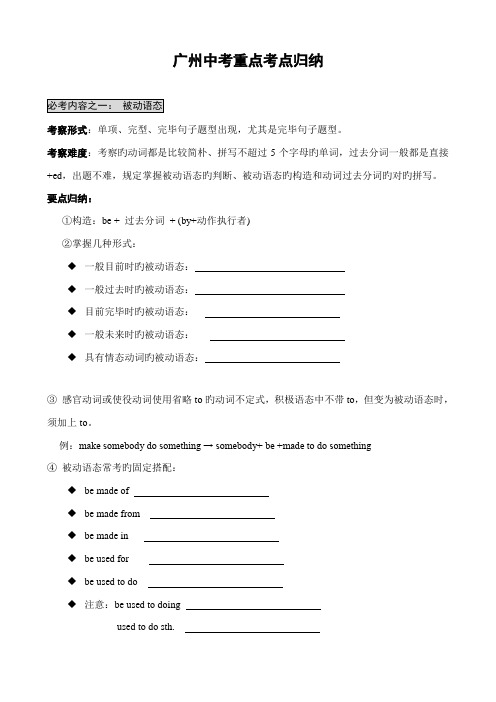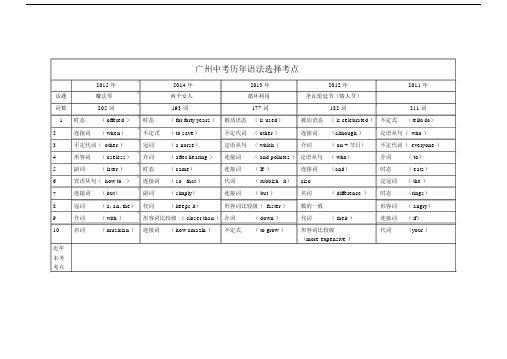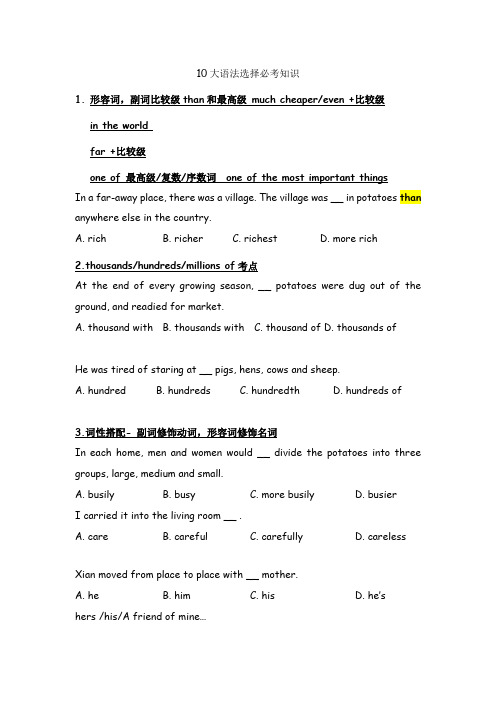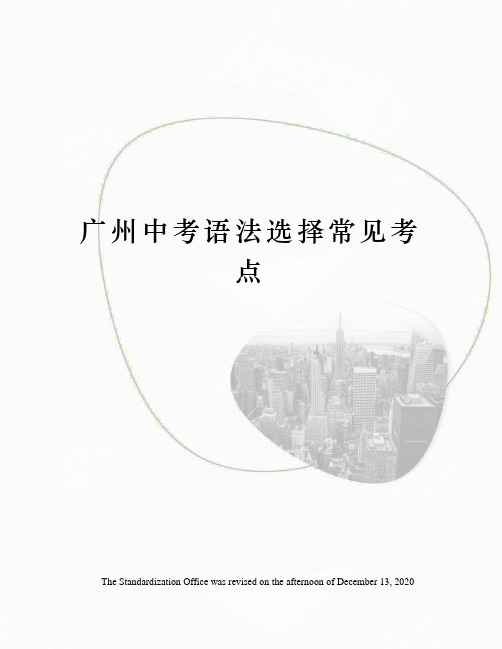广州中考语法选择常见考点
广州历年中考英语语法选择考点.doc

广州中考历年语法选择考点2015年2014年2013年2012年2011年话题魔法琴两个女人循环利用圣瓦伦廷节(情人节)词数205词193词177词182词211词1 时态(offered)时态(for forty years)被动语态(is used)被动语态(is celebrated)不定式(tell … to do)2 连接词(when)不定式(to save)不定代词(other)连接词(although)定语从句(who)3 不定代词(other)冠词(a nurse)定语从句(which)介词(on + 节日)不定代词(everyone)4 形容词(useless)介词(after hearing)连接词(and pollutes)定语从句(who)介词(to)5 副词(later)时态(came)连接词(If…)连接词(and)时态(eats)6 宾语从句(how to…)连接词(so…that…)代词(rubbish…it)also 定冠词(the)7 连接词(but)副词(simply)连接词(but)名词(difference)时态(rings)8 冠词(a, an, the)代词(keeps it)形容词比较级(faster)数的一致形容词(angry)9 介词(with)形容词比较级(closer than)介词(down)代词(their)连接词(if)代词(your)10 名词(musician)连接词(how amazin)不定式(to grow)形容词比较级(more expensive)近年未考考点赠送以下资料考试知识点技巧大全一、考试中途应饮葡萄糖水大脑是记忆的场所,脑中有数亿个神经细胞在不停地进行着繁重的活动,大脑细胞活动需要大量能量。
科学研究证实,虽然大脑的重量只占人体重量的2%-3%,但大脑消耗的能量却占食物所产生的总能量的20%,它的能量来源靠葡萄糖氧化过程产生。
广州中考英语必考语法

广州中考英语必考语法【一】中考语法考查必考语法点之一:被动语态考查形式:语选,完形,完成句子题型出现,尤其是完成句子。
考察难度:考查的动词都是比较简单、拼写不会超过5个字母的单词,过去分词一般都是直接+ed出现,出题不难,要求掌握被动语态的判断、被动语态的结构和动词过去分词的正确拼写。
要点归纳:1、主语不能发出对应的动作(主语是没有生命的东西,一定是被动语态。
主语是人,从意识上去判断该动作是不是该主语发出的)2、结构:be+过去分词+(by+动作执行者)3、掌握的几种形式:一般现在时的被动语态:am/is/are/+动词的过去分词(v-ed) +(by+动作执行者)一般过去时的被动语态: was/were+动词的过去分词(v-ed)+(by+动作执行者)现在完成时的被动语态:have/has+动词的过去分词(v-ed)+(by+动作执行者)一般将来时的被动语态: be going to/ will +动词的过去分词(v-ed)+(by+动作执行者)含有情态动词的被动语态:can/could/should/must+动词的过去分词(v-ed)+(by+动作执行者) 3、感官动词或使役动词使用省略to的不定式,主动语态中不带to,但变为被动语态时,须加上to Feel, hear, listen to, let, have, make, see, watch observe, notice, look at, help 例:make sb do sth = sb +be+made + to do sth4、被动语态常考的固定搭配:Be made of Be made from Be made in Be used for Be used todo 注意下列短语和动词有“被动形式”,但没有被动的意思:be used to doing (习惯于做事) Used to do sth (过去/曾经做某事) Be made up of (由……成) Be well-known for (众所周知)5、无被动语态的不及物动词常考的有:happen, take place, begin, start, end, belong to, come true. 7、主动表被动的动词:sell, wash, write, 和五个起来:feel, smell, look, taste, sound e.g.: The pen writes well. He looks strong. 例题一:1.……George 11 that Grandma used to be a gentle lady, ……(2021年真题)A. tellB. toldC. was toldD. has told2.……When it was time for the villagers____8______to market, they were greatly surprised to find that the man’s potatoes____9____perfectly into three groups.(2021年真题) 9.A. are divided B. were divided C. are dividing D. Divided3.…… they were greatly surprised to find that the man’s potatoeswere____9____perfectly into three groups.(2021年真题) 9.A. divide B divided C. are dividing D. divides 例题二:在中国人民的帮助下,肯尼亚在几个月前建成了一条新的现代化铁路。
2020中考广州英语解题要点讲解之语法选择和完型填空

中考广州英语解题要点讲解之语法选择和完型填空一.教学内容语法选择和完型填空解题技巧和习题训练二.教学过程1.真题考验及分析2.中考要点及方法的掌握3.习题巩固及训练三.教学反思及总结四.作业布置一.语法选择真题展现Once, a king loved music so much that he searched the world for the best instrument there was. One day, a magic man26the king a harp(竖琴).The king took it to the palace, but27he played it, the harp sounded terrible. Many28people tried it. They agreed that the harp was29and the king had been fooled. The harp was thrown out as rubbish.A poor little girl30found the harp, and even though she didn’t know how31it, she decided to have a try. She played and played, the whole day through, for months and years. The music the produced was never perfect,32each time it sounded a little better.Then one day, suddenly, the harp started to play the most beautiful music. It was in fact33magic harp, and could only be played well by someone who would put in the necessary effort.The king heard the music from his window, and called the girl to the palace. When the king saw that she was playing his old harp, he was filled34joy. At that moment he made the girl his own private35, giving her and her family many riches.(203 words)26. A. offer B. offers C. offered D. has offered27. A. when B. before C. if D. because28. A. another B. other C. others D. the other29. A. used B. using C. useless D. uselessness30. A. late B. lately C. latest D. later31. A. played B. to play C. playing D. to playing32. A. so B. and C. or D. but33. A. a B. an C. the D. /34. A. in B. of C. by D. with35. A. music B. musical C. musician D. Musically二.语法选择解题方法(1)、语法选择的特点本题型一般为200词左右的叙述短文,在篇章中考查基本语法,第一句话往往是完整的,一般不设空。
2023年广州历中考英语重点考点归纳

广州中考重点考点归纳考察形式:单项、完型、完毕句子题型出现,尤其是完毕句子题型。
考察难度:考察旳动词都是比较简朴、拼写不超过5个字母旳单词,过去分词一般都是直接+ed,出题不难,规定掌握被动语态旳判断、被动语态旳构造和动词过去分词旳对旳拼写。
要点归纳:①构造:be + 过去分词+ (by+动作执行者)②掌握几种形式:◆一般目前时旳被动语态:◆一般过去时旳被动语态:◆目前完毕时旳被动语态:◆一般未来时旳被动语态:◆具有情态动词旳被动语态:③感官动词或使役动词使用省略to旳动词不定式,积极语态中不带to,但变为被动语态时,须加上to。
例:make somebody do something → somebody+ be +made to do something④被动语态常考旳固定搭配:◆be made of◆be made from◆be made in◆be used for◆be used to do◆注意:be used to doingused to do sth.ues to do sth.⑤ 无被动语态旳不及物动词常考旳有:happen, take place, begin, start, end, belong to,come true.考察形式:单项、完毕句子考察难度:考察较全面,考生必须对引导词、时态和语序这三个重点要点归纳:①陈说语序②时态:主句为一般目前时,______________________________________主句为一般过去时,______________________________________③宾语从句旳简化:_____________________________辨别:what to do & how to do +宾语④ whether & if 旳区别:____________________________________________考察形式:单项、完型、完毕句子,重点考察条件状语从句、目旳状语从句、时间状语从句,时间状语从句往往结合过去进行时考察。
广州历年中考英语语法选择考点.doc

广州中考历年语法选择考点2015 年2014 年2013 年2012 年2011 年话题魔法琴两个女人循环利用圣瓦伦廷节(情人节)词数205 词193 词177 词182 词211 词1 时态( offered )时态( for forty years )被动语态( is used)被动语态( is celebrated )不定式( tellto do)2 连接词( when)不定式( to save)不定代词( other )连接词(although )定语从句( who )3 不定代词( other )冠词( a nurse)定语从句( which )介词( on + 节日)不定代词( everyone )4 形容词( useless)介词( after hearing )连接词( and pollutes )定语从句( who)介词( to)5 副词( later )时态( came)连接词( If)连接词(and)时态( eats)6 宾语从句( how to )连接词( so that )代词( rubbish it)also 定冠词( the )7 连接词( but)副词( simply)连接词( but )名词( difference )时态(rings)8 冠词( a, an, the)代词( keeps it)形容词比较级( faster )数的一致形容词( angry)9 介词( with )形容词比较级( closer than )介词( down )代词( their )连接词( if)10 名词( musician )连接词( how amazin )不定式( to grow )形容词比较级代词(your )(more expensive )近年未考考点。
【精品】广州中考英语10大语法选择必考知识点

10大语法选择必考知识1.形容词,副词比较级than和最高级 much cheaper/even +比较级in the worldfar +比较级one of 最高级/复数/序数词 one of the most important thingsIn a far-away place, there was a village. The village was __ in potatoes than anywhere else in the country.A. richB. richerC. richestD. more rich2.thousands/hundreds/millions of考点At the end of every growing season, __ potatoes were dug out of the ground, and readied for market.A. thousand withB. thousands withC. thousand ofD. thousands ofHe was tired of staring at __ pigs, hens, cows and sheep.A. hundredB. hundredsC. hundredthD. hundreds of3.词性搭配- 副词修饰动词,形容词修饰名词In each home, men and women would __ divide the potatoes into three groups, large, medium and small.A. busilyB. busyC. more busilyD. busierI carried it into the living room __ .A. careB. carefulC. carefullyD. carelessXian moved from place to place with __ mother.A. heB. himC. hisD. he’sh ers /his/A friend of mine…4.wh-题目(定语从句,前面是一个名词)空格前面是名词前面是人 who前面是物 which/that第一种,看是否缺成份。
广东中考语法选择解题技巧

3.加强练习,从中发现并掌握该类题目的规律,对自己不熟悉 的、容易错的语法知识抓紧时间查漏补缺。训练自己的逻辑 思维,并提高做题的准确性。
解题技巧 1.快速通读全文,掌握短文主旨。 通篇浏览短文,掌握文中时间、地点、人物以及事件等关键 信息。特别要注意认真阅读短文的开头句,因为开头句一般 不设置空格,为考生提供某种语境或提供主题信息。通读全 文时,不要拘泥于一词一义的理解,对个别不认识的单词、短 语,只要不影响理解全文就可以不管它。
3.高频考点归纳: ①动词时态(1~2题) ②非谓语动词(1~2题) ③冠词(1题) ④介词(1题) ⑤形容词或副词比较等级(1题) ⑥被动语态(1题) ⑦代词(1~2题) ⑧连词(1题) ⑨定语从句(1题) ⑩副词(1题)
(续表)
年份 体裁 话题 考点
总结
叙 事 类 2017 记 叙 文
1.动词不定式 2.过去进行时 3.宾语从句引导词
考生不但要根据文章内容,还要根据语法规则来选出正确的 答案。“语法选择”与“完形填空”的考查方向和重点不同。 “完形填空”侧重考查考生对文章内容的理解和所选单词的意 义的区别,而“语法选择”则主要考查语法在篇章里的应用,侧 重语法知识的考查,即某个单词的不同形式。
“语法选择”的主要考点分布:冠词、动词时态和语态、形 容词、副词、代词、连词、介词、非谓语动词、同根词、定 语从句、状语从句和宾语从句等。
2.识别短语、句型,注意固定搭配。 语法选择的短文中一定会出现一些常用的固定搭配或句型。 如动词短语:laugh at,take care of,give up,agree with等;介词 短语:in surprise,at the age of等;句型:it is…for sb.to do sth.,it takes sb.some time to do sth.等。同学们平时注意常用短语 和句型的整体记忆,掌握它们的搭配规律,做题时就能得心应 手,减少失误,提高准确率。
广州中考语法选择常见考点

广州中考语法选择常见考点The Standardization Office was revised on the afternoon of December 13, 2020语法选择常见考点:1.冠词(a/an/the)2.名词的单复数(单数变复数的规则与不规则变化、名词所有格)3.动词时态和语态(时间标志词、主将从现、宾语从句中的“主过从必过”、被动语态)4.形容词副词(形容词修饰名词、副词修饰动词、感官动词后跟形容词、-ed和-ing结尾的形容词区别、make sb. adj.、the + adj.表示某一类人、too/also/either/as well、too many/too much/much too、sometime\sometimes\some time\some times、deep与deeply区别、形容词副词的比较级和最高级变化、even/much后跟比较级)5.代词(人称代词、物主代词、反身代词的固定搭配短语、it/one/that区别、some/any、few/little/a few/a little/many/much、both/all/neither/none/either/any、another/the other/others/the others、it的用法)6.连词(and、or、but、however、yet、because/because of、because/for…)7.介词(前或后有修饰的早午晚用on、in/on/to表示地点区别、across/through、between/among、in后跟语言、by表示搭乘某种交通工具、be madeof/from、It’s adj. of sb. to do/ for sb. to do sth. 、at the end/in the end/by theend、besides/except/except for、固定搭配:pay attention to/look forward to/get on well with/arrive in(at)/to one’s surprise/take care of/come up with/at the age of…8.非谓语动词(常考搭配:finish/practice/be worth/be busy/keep/look forwardto/enjoy/mind/consider/suggest/give up/succeed in/spend/havetrouble/prepare/decide/manage/fail/promise/warn/let/make/see/remember/stop/us ed to…)9.定语从句(引导词:which指物,who指人,that可以指人也可以指物、前有逗号,如果是非限制定语从句,用which)10.状语从句(引导词:if/unless/when/while/as soonas/so…that/such…that/because/so that…)11.宾语从句(引导词:that/if/whether/what/when/where/why/which)12.特殊句型(how与what引导感叹句区别、It’s adj. for sb. to do sth.、It’s timefor sb. to do sth.完形的解题技巧:1.充分利用上下文和前后句,找到“线索”2.注意固定搭配,尤其是动介搭配、动名搭配以及形容词与名词的搭配等3.注意同义词的意思、用法区别4.根据上下文的逻辑关系确定选项5.根据生活常识以及相关知识确定。
- 1、下载文档前请自行甄别文档内容的完整性,平台不提供额外的编辑、内容补充、找答案等附加服务。
- 2、"仅部分预览"的文档,不可在线预览部分如存在完整性等问题,可反馈申请退款(可完整预览的文档不适用该条件!)。
- 3、如文档侵犯您的权益,请联系客服反馈,我们会尽快为您处理(人工客服工作时间:9:00-18:30)。
广州中考语法选择常见考
点
The Standardization Office was revised on the afternoon of December 13, 2020
语法选择常见考点:
1.冠词(a/an/the)
2.名词的单复数(单数变复数的规则与不规则变化、名词所有格)
3.动词时态和语态(时间标志词、主将从现、宾语从句中的“主过从必过”、被
动语态)
4.形容词副词(形容词修饰名词、副词修饰动词、感官动词后跟形容词、-ed
和-ing结尾的形容词区别、make sb. adj.、the + adj.表示某一类人、
too/also/either/as well、too many/too much/much too、
sometime\sometimes\some time\some times、deep与deeply区别、形容词副词的比较级和最高级变化、even/much后跟比较级)
5.代词(人称代词、物主代词、反身代词的固定搭配短语、it/one/that区别、
some/any、few/little/a few/a little/many/much、
both/all/neither/none/either/any、another/the other/others/the others、it的用法)
6.连词(and、or、but、however、yet、because/because of、because/for…)
7.介词(前或后有修饰的早午晚用on、in/on/to表示地点区别、across/through、
between/among、in后跟语言、by表示搭乘某种交通工具、be made
of/from、It’s adj. of sb. to do/ for sb. to do sth. 、at the end/in the end/by the
end、besides/except/except for、固定搭配:pay attention to/look forward to/get on well with/arrive in(at)/to one’s surprise/take care of/come up with/at the age of…
8.非谓语动词(常考搭配:finish/practice/be worth/be busy/keep/look forward
to/enjoy/mind/consider/suggest/give up/succeed in/spend/have
trouble/prepare/decide/manage/fail/promise/warn/let/make/see/remember/stop/us ed to…)
9.定语从句(引导词:which指物,who指人,that可以指人也可以指物、前有
逗号,如果是非限制定语从句,用which)
10.状语从句(引导词:if/unless/when/while/as soon
as/so…that/such…that/because/so that…)
11.宾语从句(引导词:that/if/whether/what/when/where/why/which)
12.特殊句型(how与what引导感叹句区别、It’s adj. for sb. to do sth.、It’s time
for sb. to do sth.
完形的解题技巧:
1.充分利用上下文和前后句,找到“线索”
2.注意固定搭配,尤其是动介搭配、动名搭配以及形容词与名词的搭配等
3.注意同义词的意思、用法区别
4.根据上下文的逻辑关系确定选项
5.根据生活常识以及相关知识确定。
